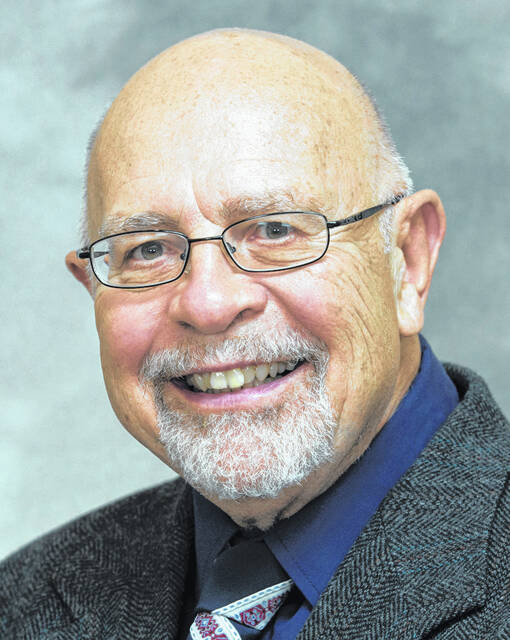
Near Darke
By Hank Nuwer
Dorothy Rowe, was the author of children’s books in the 1920s. She set her stories in China and Japan, including a best seller, “The Rabbit Lantern.”
She taught children in Nanking, China, working with her missionary parents, when she met and married Benjamin March in 1925.
March, a preeminent authority on Oriental art, was conducting research in Beijing on the Forbidden City, the world’s largest palace.
The couple outfitted their Detroit house in Asian splendor. Chinese characters graced the fireplace mantel. Confucius’ sayings covered their walls. Screens with inlaid illustrations, brass ceiling lamps, and decorative jade and wood furnishings crowded the parlor.
Their constant guests were neighbors Thomas Alfred Newton, a bond trader, and Esther, his wife of nine years. They dined on Chinese cuisine while seated cross-legged on the carpet. The Marches entertained wearing Chinese apparel.
A convert to Buddhism, Newton found Dorothy fetching in her Cantonese cheongsam dresses.
He and the attractive Mrs. Newton began meeting alone.
Not long after Dorothy gave birth to her daughter Judith, Newton alienated Mrs. March’s affections.
“Newton was very charming,” Benjamin March later recalled. “He was gay and he spent money readily.”
On Feb. 22, Dorothy and Newton confronted March in the parlor. They announced a decision to run off together.
The wounded husband surprised them with a counter proposal.
March agreed to give the couple his blessing if they performed “a love test,” living together as man and wife for 30 days.
At the end of the month, Dorothy agreed either to stay with her husband and child or marry her lover. Those were the terms.
Newton agreed to abide by Dorothy’s choice
Newton did not share his plans with his spouse. He often traveled alone.
Somehow, a newspaper reporter learned of the tryst. “I agreed on condition that (the affair) be regarded experimentally,” March told the press.
For one month, Americans in Darke County — and everywhere else — debated whether Dorothy should choose March or Newton.
Over breakfast tables across the land, March was both vilified as a cuckolded jellyfish and praised as a saint, an understanding spouse.
The lovers departed Detroit together on Feb. 24, 1930.
They booked passage on the ship Algonquin for Bermuda.
Mrs. March signed the ship’s passenger list as “Mrs. Dorothy Newton.”
Mrs. March failed to write her husband again for three weeks, not even to ask about the welfare of their daughter.
The agreed-upon month’s leave arrived. Dorothy sent March a radiogram and letters with Bermuda postmarks.
She wrote that she had made her choice. The woman who sank in her lover’s arms wanted no part of her arms filled with his laundry.
Dorothy and Newton docked in Miami. She gave her lover the heave-ho and hurried to Detroit.
As Dorothy traveled, Newton shot himself on Mar. 21. Dying in his hotel suite, he told a policeman he killed himself out of heartache.
Reporters besieged Dorothy upon arrival in Detroit. Photographers shot close-ups of Havana and Miami luggage tags on her suitcase.
The Marches stood shoulder-to-shoulder on their front porch.
Dorothy was asked about Newton’s suicide. “A man’s life is his own and he has a right to end it if he so desires,” she told reporters.
Many friends stood by the reunited couple. “Benjamin March has taught the manhood of America a lesson in charity and broadmindedness,” Mrs. Stanley M. Lewis, president of the Detroit Fine Arts Alliance told a reporter.
“Dorothy is a highly remarkable woman. She is just as welcome at my home as she ever was. In fact, I think more of her and admire her more than I ever did because she is more honest than 99 percent of the people we meet.
“If we had to fill our drawing rooms with women who had never transgressed I’m afraid our drawing rooms would be empty.”
In Miami, Newton’s broken-hearted wife and grieving father authorized cremation.
They tossed Thomas Newton’s ashes from a plane, along with 32 red roses — one for each year of his life.
The rejected Mrs. Esther V. Newton received 100 percent of her husband’s estate. A wealthy widow, she took off for the French Riviera, Italy, Switzerland and Paris. She found a playmate and remarried.
Tragically and ironically, March died four years later when his heart gave out on Dec. 14, 1934. His writings, lecture notes and other documents were acquired by the Smithsonian Institute.
Dorothy never penned another children’s novel. She died in the care of the adult daughter she once abandoned.
What was it Confucius used to say?
“Life is really simple, but we insist on making it complicated.”
Hank Nuwer is an author, columnist and playwright. He and wife Gosia live on the Indiana side of the Union City state line. Viewpoints expressed in the article are the work of the author. The Daily Advocate does not endorse these viewpoints or the independent activities of the author.

